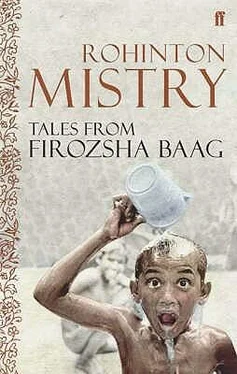Rohinton Mistry - Tales From Firozsha Baag
Здесь есть возможность читать онлайн «Rohinton Mistry - Tales From Firozsha Baag» весь текст электронной книги совершенно бесплатно (целиком полную версию без сокращений). В некоторых случаях можно слушать аудио, скачать через торрент в формате fb2 и присутствует краткое содержание. Год выпуска: 2006, Издательство: Faber & Faber, Жанр: Современная проза, на английском языке. Описание произведения, (предисловие) а так же отзывы посетителей доступны на портале библиотеки ЛибКат.
- Название:Tales From Firozsha Baag
- Автор:
- Издательство:Faber & Faber
- Жанр:
- Год:2006
- ISBN:нет данных
- Рейтинг книги:3 / 5. Голосов: 1
-
Избранное:Добавить в избранное
- Отзывы:
-
Ваша оценка:
- 60
- 1
- 2
- 3
- 4
- 5
Tales From Firozsha Baag: краткое содержание, описание и аннотация
Предлагаем к чтению аннотацию, описание, краткое содержание или предисловие (зависит от того, что написал сам автор книги «Tales From Firozsha Baag»). Если вы не нашли необходимую информацию о книге — напишите в комментариях, мы постараемся отыскать её.
Tales From Firozsha Baag — читать онлайн бесплатно полную книгу (весь текст) целиком
Ниже представлен текст книги, разбитый по страницам. Система сохранения места последней прочитанной страницы, позволяет с удобством читать онлайн бесплатно книгу «Tales From Firozsha Baag», без необходимости каждый раз заново искать на чём Вы остановились. Поставьте закладку, и сможете в любой момент перейти на страницу, на которой закончили чтение.
Интервал:
Закладка:
Jehangir found the man’s effusive devotional talk embarrassing. He wished his parents would stop encouraging him by nodding pious looks of agreement. Bhagwan Baba appeared now, supported by two men. Something like a collective suspiration was audible in the garden. Then the scattered whispering fell silent. He was dressed in a white kurta-pyjama , and looked quite frail, with bare feet. His head was bald but he had a white beard. A short stubbly beard. And he wore dark glasses.
“Sometimes he takes off the glasses,” the man whispered, “then at once puts them back on. Everyone waits for that, to see his eyes. Exactly what it means I don’t understand. But it is absolutely significant, most definitely.”
Two little boys and their older sister climbed onto the bench-swing in the corner of the vegetable garden. Their clambering set it into a gentle, squeaky oscillation. The sister sustained the motion of the swing with a pushing-kicking movement of her legs. During the forward swing her skirt billowed, then fell with the retreat; forward and back, billowed and fell.
Out of a long-formed habit Jehangir, craning, positioned himself to obtain the best view. When he had newly started going to college he discovered a pastime to which the Law of Diminishing Returns did not apply. The excitement of descending the stairs sometimes kept him from paying proper attention during class. There were two flights to each floor, and as he rounded the splendidly carved newel at the end of the first flight, his eyes lifted upwards. Above him flowed a stream of panties, a cascade of crotches out of the heavens, while he descended slowly, hand upon the balustrade to keep his balance, for it was heady stuff.
The thrills of this sport suffered greatly after that day at choir practice when she spoke to him. He realized that she could be amidst the descending crowd while his head was thrown back at a right angle to his trunk. It would be mortifying if she spotted him in this stance, she who believed him shy and, doubtless, pure of mind. Like Mother who, until recently, would say with pride, “My Jehangir, such a quiet good boy, aitlö dahyö , make choon or chaan . Does everything I tell him.” What a revelation if she could enter his prurient mind. Ironic that two women so different could share the same misconception, both beguiled in identical ways.
The bench-swing reminded him of the exercisers in the children’s playground. He now gave that place a wide berth when he visited the Hanging Gardens, preferring to think that the playground and the exercisers belonged to a part of his life which had concluded for good. He wondered if the exercisers still went there every night, if their muscles had developed further since he last saw them more than two years ago.
The children lost interest in the swing. It slowed down, steadying into its former stillness, with the squeaks coming further and further apart, then dying away completely. Jehangir turned away from it, feeling victorious after his sighting. Not only had he succeeded, he had done so in Bhagwan Baba’s garden amidst devotees thinking pious thoughts, and the touch of blasphemy was particularly satisfying. The sanctimonious fellow in front had been quiet for a while, not sharing any more of his insider’s information. His turn was next. He smiled at Jehangir and his parents, and stepped up to the veranda. The sun had progressed in its descent, and the pumpkin vines and tomatoes would soon need watering. A slight breeze was evident in the faint rustle of leaves.
Now they were first in line. Jehangir’s apprehension and uncertainty returned. He began digging frantically in his trousers for the photograph before remembering that on the train, while his parents slept, he had transferred it from his wallet to his shirt pocket. “How do we start this?” he asked. “Do I show the photo first?”
Mother said she would take care of that. All he should do was listen carefully when Bhagwan Baba spoke.
From Bhagwan Baba’s house to the railway station was a short walk along a dirt road. Jehangir and his parents hurried along silently in the face of a rising wind. A sombre, rainless cloud cover dominated the sky.
The dirt road was deserted. The suns midday sharpness had been replaced by a heavy, stifling air mass moving over the land. Clouds of dust rose at the least provocation and Mother held a handkerchief over her nose and mouth. A few simple shacks and shanties on either side of the road were the only structures on the barren plain. Their sunken-cheeked occupants watched with empty eyes as the three figures made their way to the station.
The shelter of the waiting-room was a relief. It was deserted except for the man attending to the cold-drink stand. They purchased three bottles of Limca and settled on a bench to await their train. The bottles were closer to tepid than the ice-cold promised by the sign, but the drink was refreshing.
Bathrooms were located next to the cold-drink stand. From behind one of the doors emerged the song of a broken tap, the copious drip splashing in complex, agitated rhythms upon the stone floor.
“Shortage of water everywhere. But listen, listen to the shameful waste,” said Father. He sipped Limca through the straw, anticipating the final empty gurgle to signal the end. “It was a little disappointing. He removed his dark glasses to see the photo, but did not say much. And three hours in line.”
Mother said, “That is normal. Bhagwan Baba never speaks unless you ask him specific things. Jehangir did not open his mouth sidhö-padhrö , to speak clearly. Not one word. What do you expect Bhagwan Baba to do?”
“But you said you would explain …”
“I said I would begin for you. That does not mean you show no interest in what is your problem.”
“I don’t have a problem. You do because you don’t like her.” The entire day had passed without argument. Now it seemed the heat and dust would take their toll.
“I never said I do not like her . But no sense talking to you, you don’t want to understand. We decided to come, you should have shown more concern. Now we still don’t know what is the best thing for you.”
Jehangir returned the empty Limca bottles to the cold-drink counter. A ceiling fan hung motionless in the waiting-room, and he pointed to it when the cold-drink man caught his eye. “Power shortage,” the cold-drink man replied. “No lights even. At night I sell by lantern light. And kerosene is not cheap. So price of cold-drinks had to go up.”
Jehangir nodded indifferently and returned to the bench. Father said, “Bhagwan Baba did not say much. But it seems to me he did give an answer. He said life is a trap, full of webs. Ask yourself, what does the sensible person do if a trap is facing him? Avoid, get away from it. So I think Bhagwan Baba was saying that Jehangir should stay away from that girl.” He was pleased with his interpretation.
“But if that was what Bhagwan Baba meant, why not say it plainly?” said Mother. “Every other time he has given us plain answers, simple language.”
“I don’t know. There is always a reason for what Bhagwan Baba does. That much I know. To me his words sounded like a warning for Jehangir.”
“But Jehangir is not saying anything. Again you are staying quiet, like you did with Bhagwan Baba. Tell us whatever is on your mind.”
And he was tempted to tell: of the sight which had shocked and embarrassed him one night when he had come home, changed his clothes, and left them on the pile for the gunga to wash next morning. A few minutes later he had returned, having forgotten his pen in one of the pockets. But Mother was there, sniffing; scrutinizing the gusset under the light. To find smells of illicit sex? Stains to corroborate her suspicions of the girl’s sluttishness? Evidence that her boy had been ravished by a flesh-and-blood succubus? She had started counting garments for next day’s washing quota when she saw him.
Читать дальшеИнтервал:
Закладка:
Похожие книги на «Tales From Firozsha Baag»
Представляем Вашему вниманию похожие книги на «Tales From Firozsha Baag» списком для выбора. Мы отобрали схожую по названию и смыслу литературу в надежде предоставить читателям больше вариантов отыскать новые, интересные, ещё непрочитанные произведения.
Обсуждение, отзывы о книге «Tales From Firozsha Baag» и просто собственные мнения читателей. Оставьте ваши комментарии, напишите, что Вы думаете о произведении, его смысле или главных героях. Укажите что конкретно понравилось, а что нет, и почему Вы так считаете.












